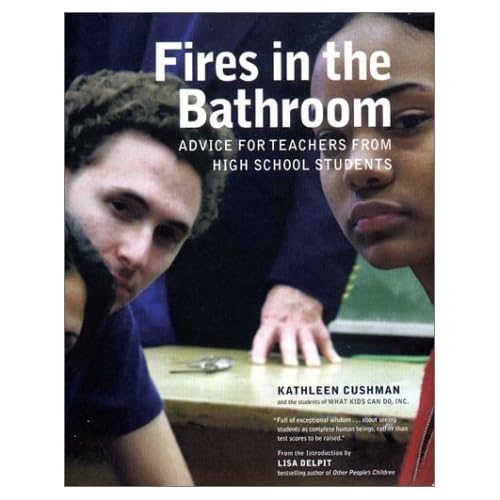I was asked recently about my inspiration to become a teacher. I had previously written a piece on that. So, here it is. The way I was inspired to teach...
I came to be a teacher from a different direction than a most educators I know. Most of my colleagues can point to an influential teacher who was so wonderful, so marvelous, that they were inspired to be like that person. Not me. (Okay, in later years I had many a teacher whose good example I sought to emulate--but this essay is going back to the first cause.)
It was not a particularly good teacher that inspired me to teach, but a particularly bad teacher. At least from my perspective. Mrs. Brown, my fifth grade teacher, seemed to me to be about 90 years older than God. She was petite, barely over five feet tall. And I was completely terrified of her. Her strong Southern accent was a novelty for me. Her hostile attitude was like nothing I had ever encountered before.
I remember one time near the end of the school year in particular. I was the most naive, gullible dupe. Several of the students in the class, who had been picking on me unmercifully for months, had decided on a new strategy to get to me. Throughout the day they fed me the story, over and over, that there was going to be a big racial fight after school. Different people mentioned it to me at different times. Some allowed me to overhear them talking with each other about it.
It was in South Florida in the 70s. It was possible, even in fifth grade I knew that. And I was scared. Scared for myself, especially after one girl, new to the school, told me with absolute sincerity that I was a target for the black kids (she used a racial epithet here). I was more scared for my brother, he was a kindergartner in the same school. By the end of the day, I was a wreck. I sat in my desk, sobbing with anxiety.
She asked me what was wrong and I told her about the fight to come. She laughed and told me that was ridiculous. There was no such thing gonna happen. Then she said, and I remember this clearly, “And now need the whole class to sit here laughin’ at you.” They complied. No empathy. No concern. No offer of any kind of understanding. That is the first time I can remember an adult being intentionally cruel to me.
She had her mind set on the way teaching and learning were supposed to happen and anything--or anyone--differing from that preconceived notion was wrong. I guess that made me wrong. For the first time I was not doing well in school. I was getting more quiet and withdrawn. I was called in to see the counselor, who gave me some tests. Being the good little schnook that I was, I took them without a thought as to why. I was “diagnosed” as being gifted. I say diagnosed because the school system seemed determined to cure me.
I was placed in a pull out program. Twice a week I was removed from Mrs. Brown's class to work with the special education, gifted and talented class. This seemed to infuriate Mrs. Brown. I think she felt highly insulted that she was not deemed to be “good enough” to teach me. As I was not making stellar grades in her class to begin with, she could not understand why I was being put in the special ed class. After all, if I was so “gifted,” shouldn’t I be passing her classes?
She failed me for the work I missed in her class. She would only grudgingly, if at all, help me catch up on the work I missed, after all, I was "gifted," right? I should be able to catch up without her help. She never missed a chance to scorn my work publicly and to hold up the work of other students not in the special ed program as examples of work as markedly superior to whatever I turned in.
The students in the class picked up on her attitude. They began to call me names. Poke me. My school supplies would disappear. I was cut off from their society. It was not enough that I was new to the school. Not enough that I was shy and bookish. The teacher was against me. As the year progressed, it got worse and worse right up to the racial fight hoax.
I do not think she could have failed to notice what was going on, but she never attempted to put a stop to it. I don’t know, maybe she thought she was toughening me up or something equally silly. As a teacher myself, I am appalled by her behavior.
When my parents complained about her to the principal, they were told, in essence, “It's her last year; we don't want to make any trouble for her.” Although not particularly surprised by it, I am even more appalled by this attitude on the part of the administration. Schools do not exist for teachers, but for students. Worrying about trouble for her was not what their focus should have been. Worrying about what she was doing to students should have been what they were most concerned about.
Their idea was to come up with a compromise, they offered to move me to another fifth grade classroom. For some reason, the decision was left by the administration to my parents, and by my parents to me. Remember, I was a fifth grader and they were adults. I have always been too stubborn for my own good. Apparently I was very persuasive when I elected to stay in her class. I was not moved. And after that I lost any recourse of going to the office, as I had rejected their solution. I felt even more isolated and cut off after that.
Why would I stay there, though? Why wouldn’t I get out when I could? For some time I felt it was because I was too stubborn to leave. If she didn't like me the worst thing I could do was stay there in her face. I think the more honest answer was that I had one really good friend in the school, from my perspective at the time one really good friend in the whole world, and Jack was in that class. I had always had trouble making friends. I was afraid that if I left I would never make another friend and that was scarier than anything the teacher could do to me.
Often as I sat there I thought that anyone could be a better teacher than she was, even me. There was my spark. As I progressed in school I had teachers who made a deeper positive impression in me, but it was Mrs. Brown in fifth grade who started me off on my current path. Without her I might have never been inspired to teach.








